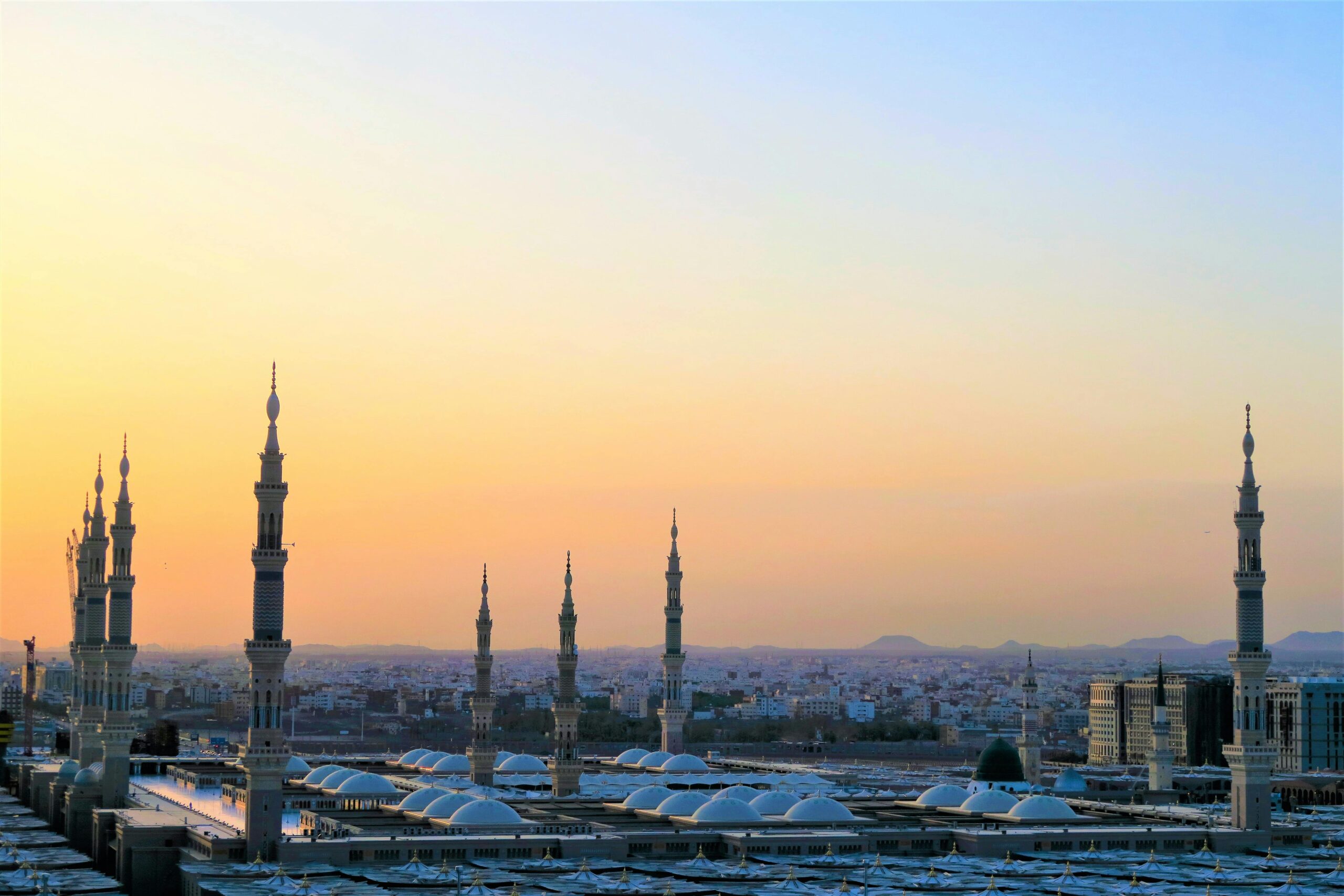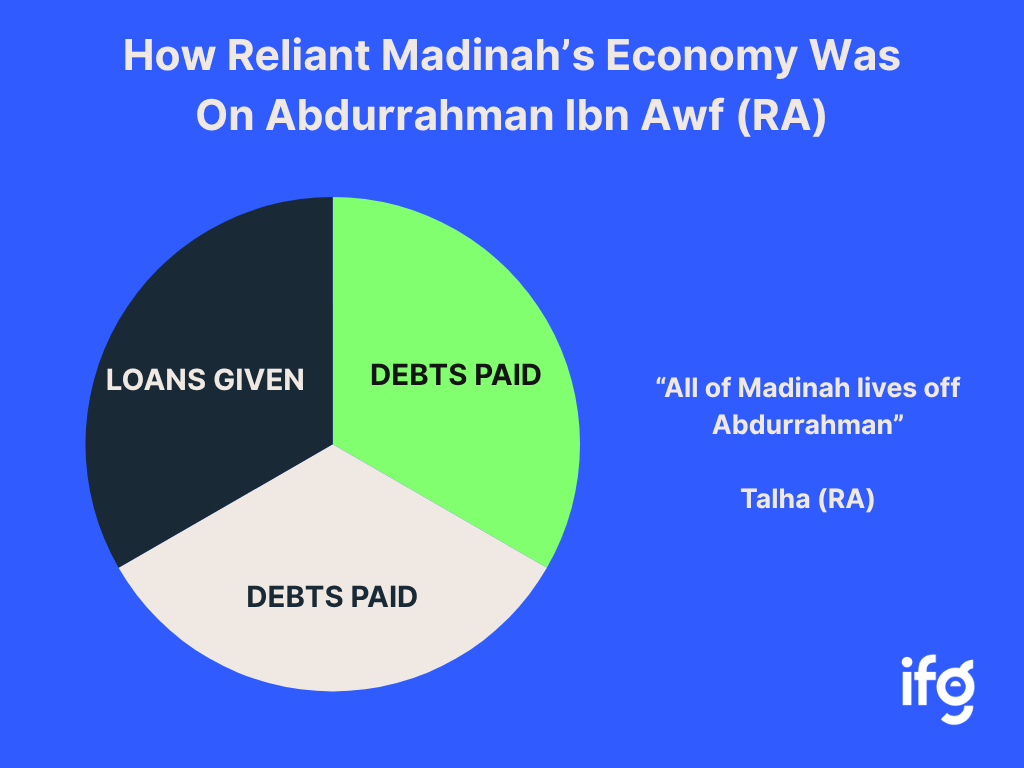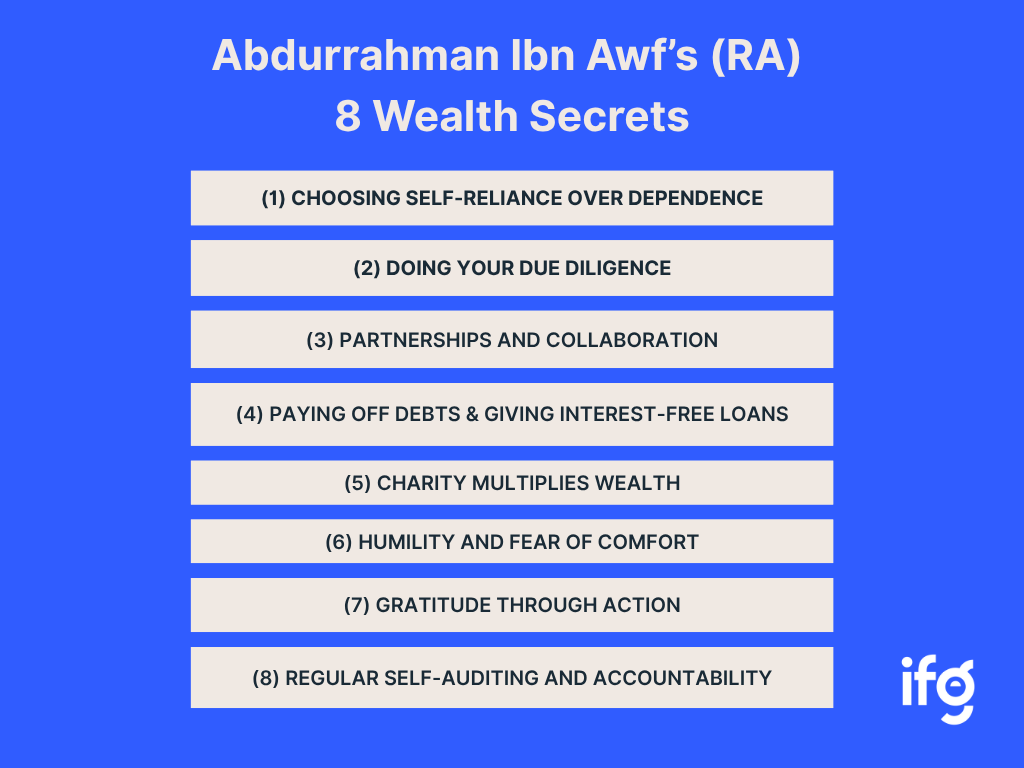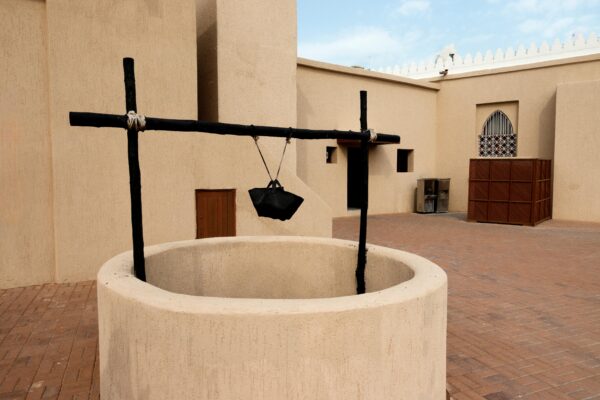
6 Wealth-Building Lessons from Khadijah (RA) Every Muslim Should Know
03 December 2025 8 min read


Ibrahim Khan
Co-founder
12 min read
Last updated on:
Most Muslims today either lack financial literacy or they get their financial education from non-Muslims such as Dave Ramsey, Robert Kiyosaki (the author of Rich Dad Poor Dad) or worse, TikTokers. That’s a shame, because there are many Muslims from Islam’s rich history whom we can learn from.
One such Muslim was Abdurrahman Ibn Awf (RA), famously one of Prophet Muhammad ﷺ’s closest and wealthiest companions. But very few people know of these eight detailed wealth-building secrets from his life that we have researched from ancient sources, such as Tabqaat Ibn Sa’d, which cover his life, complete with actual stories [1].
Some of which are actually really easily copied strategies to get wealthier today, even in this day and age. So make sure you read until the end.
If you prefer video over text, you can watch our YouTube video here.
Born in 581 CE in Makkah, Abdurrahman Ibn Awf (RA) was famously one of Prophet Muhammad ﷺ’s closest and wealthiest companions. He was also one of the ten companions promised Paradise by the Prophet PBUH [2].
Not many in modern-day finance circles match the scale of Abdurrahman Ibn Awf (RA). He’s known to have once rolled into Madinah with a caravan of 700 loaded camels. One camel in those times was equivalent to a supercar in our times, all of which he then ended up donating away. The stories of his generosity are legendary. But behind that generosity was strategy, perseverance, and an unwavering faith. So let’s dive in. Starting with one of the most often overlooked wealth secrets from his life.
You might assume that Abdurrahman (RA) inherited his wealth, but nothing could be further from the truth. When he arrived in Madinah after escaping persecution from Makkah, he literally had nothing after leaving behind most of his wealth, as did the rest of the migrants. He was starting from zero again.
When he arrived, the Prophet PBUH paired him with Sa’d ibn Ar-Rabi’, who offered him half of his wealth and even one of his wives.
Yet, Abdurrahman (RA) politely refused, and he famously said, “Just show me the way to the market.”
He started trading in basic commodities like dried yoghurt and butter, ensuring that every deal he did was transparent.
Why?
Because self-reliance is the key thing here, it is at the heart of our Islamic tradition.
Allah SWT says in the Qur’an:
“Indeed, Allah does not change the condition of a people until they change what is in themselves.” (Surah Ar-Ra’d 13:11)
We are not a nation of handouts, we are a nation of action and proactivity, a can-do attitude, where Abdurrahman (RA) wanted to stand on his own two feet as much as possible, even though he was offered help, legitimate halal help from his friends. He didn’t want to take it; he wanted to do it himself, and it was that attitude which led him to set up a very prosperous business, very quickly.
And he even got married early on.
Many entrepreneurs today try to put off marriage, saying, “Let me start my business or career first. In my 20s, I just want to focus on that, and I don’t want to get married quickly”.
Abdurrahman (RA) got married very early, and that, for those of you who aren’t married yet, is a great lesson. Getting married early could be a wealth secret right there. And it paid off, as within days, Abdurrahman (RA) had enough gold to pay for a dowry and more.
In one lesser-known account from Tabaqat al-Sa’d, it notes how he actually kept meticulous records so no shady or unethical transactions could creep in whatsoever.
The next wealth secret is doing your due diligence. Abdurrahman (RA) was no mere bystander. He scouted market trends, he built strong relationships, and he reinvested his profits.
The Qur’an talks about having Ihsan or excellence in every single endeavour that we do.
“Spend in the way of Allah and do not throw yourselves with your own hands into destruction” (Surah Al-Baqarah 2:195)
In other words, you should make sure you are making sensible and wise decisions and do good, indeed Allah SWT loves the doers of good and loves the doers of Ihsan, those who strive for excellence.
According to some narrations, Abdurrahman (RA) would personally inspect goods for the quality, ensuring that there was fair pricing so that even new customers felt safe buying from him.
An anecdote from an early historical source said that if he sensed a product might be defective, he’d clearly mark it as such and lower the price rather than trying to hide the flaw. This earned him a sterling reputation. And where trust flourishes, business thrives.
Next, let’s talk about collaboration.
The Qur’an urges us to help one another in righteousness:
“And cooperate in righteousness and piety…” (Surah Al-Ma’idah 5:2)
Instead of hoarding capital, Abdurrahman (RA), who had been given so much and who could have said I don’t want to send any of my money, I don’t want to help any people around me so that they might become my competitors.
No, he would share his resources; he would give interest-free loans to the smaller traders so that they could get started. He wouldn’t worry about whether they might become his competitor; no, he would help them out, and then there was no riba involved either, so the relationship wasn’t exploitative.
Tabaqat Ibn Sa’d accounts that many of Madinah’s new entrepreneurs owed their break to Abdurahman (RA). They repaid him if they could; if not, he sometimes wrote off their debts and guess what? When those traders succeeded, they’d bring more business to him in gratitude as a result of that; that’s a powerful win-win.
Now let’s turn to the legendary narration from Talha (RA) who said that one-third of Madinah had debts that Abdurrahman (RA) paid off for them. One-third took those interest free loans from him so that they could prosper and build their business. And the remaining one-third, they received charity directly from Abdurrahman (RA).

Talha (RA) famously said that all of Madinah lives off Abdurrahman (RA). Imagine that scope, he systematically freed people from debt burdens, helped them stand on their own two feet and then supported entire families with pure sadaqah where that was needed.
Just like Abdurrahman (RA) looked after his people, we need to stick together today and look after our community. One way you can do that is by joining the IFG family and sharing this article with others who you think will really benefit from this, in sha Allah.
This one, you’ve probably heard of before, where the Prophet Muhammad ﷺ said:
“Charity does not decrease wealth.” [Sahih Muslim 2588]
But let’s see how that looks in action.
Historians mentioned that there was a time when Abdurrahman (RA) brought a 700 camel caravan loaded with goods into Madinah. When the caravan had crossed Madinah and it was actually leaving Madinah, the other end of it hadn’t even entered the other side of Madinah; that was how long that caravan was.
When he heard a hadith from the Prophet Muhammad ﷺ cautioning him about the test of wealth in the hereafter, he started weeping, and he donated the entire caravan on the spot because he cared about the Akhirah; he was not attached to that money even though the money chased him; he was not attached to it. To the outside eye, that seems insane, yet it only increased his barakah, and soon after, other profitable opportunities arose, which restored his wealth several times over once more.
Allah SWT talks about this kind of act in the Qur’an when he talks about a goodly loan to Allah SWT.
“Who is it that will loan Allah a goodly loan so He may multiply it for him many times over?” (Surah Al-Baqarah 2:245).
You see, this is not all just theory, Abdurrahman (RA) lived this life.
Despite his fortune, Abdurrahman (RA) never grew arrogant. We have accounts in which he wept when a lavish meal was served to him, remembering that his companion, Mus’ab ibn ‘Umayr (RA), who died with practically nothing, who would have never have seen something like this, he’s reported to have said “I fear we have been given our blessings in this life instead of the next”.
And this man, who was promised paradise from the Prophet Muhammad ﷺ. He was already guaranteed that he was going to Paradise, and yet this was his level of humbleness and his level of piety.
The Qur’an warns against arrogance, and he took that warning seriously. Allah SWT warns:
“And do not turn your nose up to people, nor walk pridefully upon the earth. Surely Allah does not like whoever is arrogant, boastful” (Surah Luqman (31:18).
Abdurrahman (RA) would constantly check his heart, ensuring that wealth didn’t make him forget his internal goals.
Allah SWT in the Qur’an promises something incredible,
“If you are grateful, I will certainly give you more…” (Surah Ibrahim 14:7).
Historians say that Abdurrahman (RA) would mark each successful trade with extra thanksgiving, distributing food among the poor, sometimes freeing slaves as a direct expression of gratitude.
And one lesser-known story is that once there was a harvest from an orchard that he owned, which nearly tripled the expected yield, and he immediately hosted a public feast, declaring all of this is from Allah SWT, so let Allah’s creation share in it. That’s more than lip service; he showed gratitude with his actions and that, in turn, brought even more barakah into his wealth.
Abdurrahman (RA) feared wealth could become a trap. Allah SWT says in the Qur’an:
“Let every soul look to what it had put forth for tomorrow” (Surah Al-Hashr 59:18).
Abdurrahman (RA) would regularly reflect on his balance of charitable giving versus accumulating. Narrations mention how he’d actually kept an updated tally on how many camels and goats or gold coins he had, and then he would cross-check that with how much had been distributed in the path of Allah SWT.
So by constantly doing this auditing, he ensured that his moral and his spiritual well-being kept pace with his financial growth at the same time.
But oftentimes we hear these teachings and we think, “Ah, that’s a nice reminder.” We shrug our shoulders and we carry on. But certain people in our community take this to heart and run with it. Their economic outcomes have been spectacular, and I’m going to share 4 examples with you now. And if you rather you can watch the stories here.
The first example is my own:
I donated an amount that felt large to me; I wasn’t sure if I’d gone too far, but then, within the next week, I found that, unexpectedly, I had this investment of over £500,000 that was made on the platform. Then, a few weeks later, I donated £100 to charity, and the very next day, I received a payment of £10,000 from HMRC.
“When I was in my investment banking career, and I had made the intention to leave and give it all up and to sacrifice a lot of money to go on a better path, to serve God’s cause and to do something more meaningful and faithful with my life”.
“I remember thinking that I would never end up going on luxury holidays again so in my budgeting for the future I had to cut out all this stuff that I was used to and I remember just thinking to myself, you know what, I’m just going to give up on the idea that I’m actually going to be able to travel much or at all on what will be probably a very low compensation to what I’ve been used to”.
“But, in the 10 years since Allah has taken me to dozens of different countries, amazing trips, lots of travel and so it just shows he provides from where you just don’t expect”.
“And He will provide for him from where he does not expect” (Surah At-Talaq 65:3).
“In 2010, I was presenting a live appeal on Islam Channel and we were raising funds for Pakistan, which had been devastated by floods”.
“A brother called in and immediately became emotional. He shared with us a story that for years he had been working to save enough money to go to Hajj; he’d struggled, but he had just met his target, Alhamdulilah and was about to book his ticket. But then, when he witnessed the suffering of his brothers and sisters in Pakistan, he felt compelled to do something about that and instead decided to donate every penny towards our Pakistan appeal”.
“Subhan’Allah! There were takbirs… Allah hu Akbar! It was so emotional”.
“Two or three calls later, a travel agent called in and said that he wanted to be connected to that brother because he was willing to take him to Hajj, all expenses paid, subhan’Allah”.
“It reminds us of the hadith of the Prophet Muhammad ﷺ when he said that if you give something up for Allah, Allah will replace it with something better. In that moment, that hadith came to life and it was inspirational, subhan’Allah”. [3]
“To give an example of a family-run business from Birmingham who have, ma’sha’Allah, over the years continued to give thousands upon thousands of pounds and I remember that I’d come to see them in Ramadan, and I would subtly ask them, from the donations you’ve been giving, they seem to be increasing every year, how is the business going? Are you finding a decrease in the amounts? And they said, Alhamdulilah, every single year they see an increase, and I find that really remarkable, especially their Zakat being on the increase, and what’s beautiful about the meaning of Zakat is that no doubt it has the meaning of purification, but it also has the meaning of increase and growth, may Allah give them more in return, ameen”.
Here’s how to bring these lessons into your own life:
Abdurrahman (RA), alongside Uthman Ibn Affan (RA) and Abu Bakr al-Siddiq (RA), was renowned as one of the wealthiest companions of the Prophet. Reports of his wealth vary between $100 million and $600 billion. But we do know that Madinah’s economy was reliant on him. Talha RA once said that one-third of Madinah lived off his charity.
The story of Abdurrahman (RA) is living proof that you can build wealth and still keep your heart grounded in the hereafter. His life teaches us the importance of being generous, striving for excellence (ihsan) and being humble. So before we look to modern finance influencers, let’s first turn to our own heroes like Abdurrahman Ibn Awf (RA). We’ve summarised his lessons in the graphic below.

If you want to learn more financial lessons from the Qur’an, you can download our free ebook containing 30 bite-sized lessons on how to manage your money in a way that pleases Allah here.
May we walk in his footsteps, and may our wealth be a source of benefit, not just in this life, but in the next, Ameen. If you enjoyed this and would like to see more content like this, leave a comment down below.
You may also be interested in reading our article on wealth secrets inspired by the life of Uthman Ibn Affan (RA).

03 December 2025 8 min read

26 November 2025 6 min read

13 August 2025 12 min read
FAYAZ AHMAD
7 months ago
Asalamo alikum wa RehmatuALLAHIE wa Barakatahu, May ALLAH Guide us all and ALLAH fill our hearts with his fear for this surely leads to prosperity.